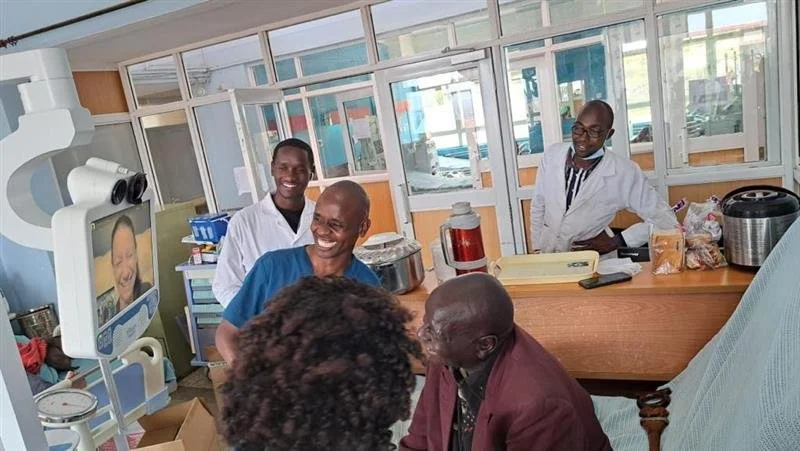Fighting kidney disease: How telehealth can revolutionize nephrology care in low-resource settings
Tackling chronic kidney disease in underserved areas
Chronic kidney disease (CKD) affects approximately 800 million people worldwide and has emerged as a leading cause of mortality, particularly in low- and middle-income countries. With limited access to specialized healthcare, countries like Bangladesh and Kenya face a high burden of non-communicable diseases like CKD. Nephrology care is in high demand but remains scarce in many regions, including Africa and South Asia. To help bridge the gap, World Telehealth Initiative has stepped up our nephrology support in Kenya and Bangladesh at the request of our partners.
Dr. Conley (on telehealth device screen) leads virtual dialysis rounds at Longisa County Referral Hospital.
Bringing renal care to Longisa, Kenya
Approximately 14% of people in sub-Saharan Africa suffer from chronic kidney disease. Kenya has only 41 nephrologists for its entire population of 53 million people. Many people with CKD in Kenya cannot access the care they need.
Longisa County Referral Hospital in Kenya has patients on dialysis, but there is no local nephrologist. World Telehealth Initiative is tackling this issue by connecting the hospital with the necessary specialists. Dr. Conley, one of WTI’s volunteer nephrologists, conducts telehealth rounds and helps care for patients on dialysis at the hospital, while teaching local clinicians about renal care. The dialysis rounds have advanced the management of CKD patients and enhanced the hospital’s ability to handle nephrology cases, improving patient outcomes.
Dr. Weldon, Deputy Medical Superintendent at Longisa County Referral Hospital, shares how the WTI program has impacted the hospital:
“There is a lack of specialists in our region, which is not just isolated to Longisa, but the whole country. Sometimes you don’t even have access to very specialized doctors, and you use general practitioners, such as myself, to do everything from casualty, critical care, all the way to the operating theater…and that has been a strain. Luckily for us, we are now exposed to these consultants [through WTI] who have specialized in different fields and they’re able to guide us…and we have been able to see real improvement in terms of service delivery.”
Dr. Conley supports local clinicians with nephrology patient.
Free nephrology care for patients in Dhaka, Bangladesh
In Bangladesh, an estimated one in five adults suffer from CKD and there is a severe shortage of nephrologists—only one available for every 0.8 million people. 35,000 – 40,000 new cases of end-stage renal disease are reported annually, with insulin resistance being a predominant risk factor linked to the disease. Chronic glomerulonephritis, diabetes mellitus, and hypertension are the principal causes of CKD in Bangladesh.
World Telehealth Initiative’s program in Dhaka supports vital health services for vulnerable nephrology patients for free at the Filaria and General Hospital in Dhaka. Through telehealth consultations, Dr. Conley assists local clinicians in managing and treating kidney disease while expanding local knowledge and advancing patient care. This program has proven to be vital in increasing renal care access and improving CKD management in Dhaka.
Bridging the renal care gap
These programs demonstrate the contribution of WTI’s programs to overcome health challenges in underserved areas—providing access to vital training, support, and expert guidance that was previously unattainable. This fruitful collaboration has resulted in more precise diagnoses, personalized treatment plans, and better management of CKD patients. Through international collaboration and innovative solutions, together we continue to make a tangible difference in the lives of those in need, advancing global healthcare and revolutionizing humanitarian work.
A special thank you to Dr. Emily Conley for her dedication to supporting clinicians and caring for nephrology patients worldwide.



